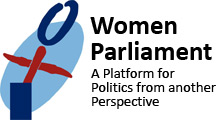The Israeli Women Parliament
Background

The Israeli Women Parliament is a platform for critical and feminist debates on the prevailing policies and discourse in Israel. The Women’s Parliament was founded in 1999 by Shin – the Israeli Movement for Equal Representation of Women; The Friedrich Ebert Stiftung; Beit Berl Academic College; and Hen – Hertzliya Women. Since its foundation in November 1999 the Parliament conducted 69 sessions (four of which were sessions of the Young Women’s Parliament). Over 10,000 women from diverse backgrounds attended the sessions.
The Parliament’s sessions were organized with the cooperation of mayors’ advisors on women’s issues, all over the country: Hertzliya, Kiryat Shmona, Beer-Sheba, Tel Aviv, Jerusalem, Haifa, Holon, Peki’in, Kfar-Saba, Tira, Ramat-Gan, Jiser El-Zarka, Giv’atayim, Daliat El-Carmel, Shoham, Bak’a El-Garbia, Kfar Yona, Rosh Ha’ayin, Katzrin, Rishon Lezion, Ra’anana, Rechovot, Kalansua, Modi’in, Ganei Tikva, Mitzpe Ramon, Bat Yam, Sderot. Some of the sessions took place in the regional councils of Gezer and Lev Hasharon, Mate Asher and a few were organized in institutions: Beit Berl Academic College, an Army base, Neve Tirza – women’s prison, El-Kassami College, Sapir College.
One significant achievement of the Women’s Parliament is the public exposure that it offered women with evident accomplishments in the professional and social activity spheres, through their appearance on its Panels. Women have presented their vast knowledge, insightful interpretations, moving testimonies and impressive professional experience at the Parliament’s debates. They articulated the multiplicity of Israeli women’s voices emanating from a variety of groups: religious, secular, Jewish, Arab, lesbian, Ashkenazi, Mizrahi and others
Main Goals
Enhancing the conspicuousness of feminist perspectives
- In the public discourse
- Of original-critical view-points of women from divergent backgrounds.
The Women Parliament’s sessions brought up a wide range of topics and discussed them from both the general and the feminist perspectives. Among these were: the state budget; minimal wage; welfare, educational and absorption policies; peace negotiations and processes; wars; media coverage; economics; violence; crime and terror; beauty contests; prostitution, pornography and trafficking in women; military service; political corruption; high education; children’s custody and parental rights; teachers’ status and working conditions; center-periphery relationships; gender in local and national elections; ecology; elections; sports; the labor market; girls in school, etc.
Enhancing the conspicuousness of prominent women
- With unique professional
- Who had a social contribution to public life and social issues in Israel
More than 350 women speakers (and a few men) presented their profound knowledge, insightful interpretations, moving testimonies and impressive professional experience, at the Women Parliament’s debates. They represented Israeli women’s voices from various backgrounds: the academia, the media, the arts and field activism. They were religious and secular, Jewish and Arabs, veterans and immigrants, from the right and from the left, etc. All conveyed the message that Israeli women can offer unique interpretations for political, economic, social and other issues that are on the public agenda and that they strive to influence the prevailing policies.
Watch: A Decade of Women’s Parliament Israel Social TV
On October 2009 a video was dedicated to a decade of Women’s Parliament, which describes their activity.
Language: Hebrew (with English subtitles)
Click here to watch >>
Women Parliament on Facebook >>
Issues on the Agenda
- Education and Gender
- Women’s Representation
- Feminism in Israel
- Trafficking Pornography & Prostitution
- Women’s Discrimination and Exclusion
- Women and Immigration
- Violence Against Women
- War & Peace, Army, Militarism, Terror
- Women and Girls in Sports
- Ecology and Feminism
- Impact of the Media in Shaping Girls’ and Women’s Images
- Motherhood, Family, and Children
- Women’s Health
- The State, Religion and Women
- Economics & Gender
- Forewords from Women Parliament Sessions
- Her-Story – Women in History
